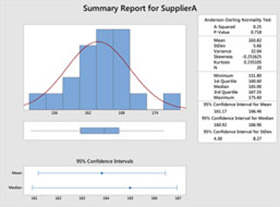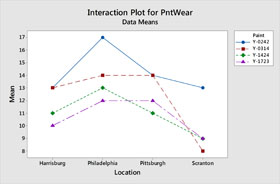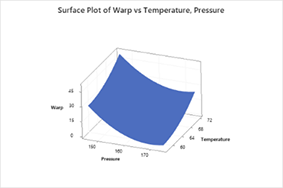This 4-day track provides participants with the skills needed to use various DOE techniques to effectively plan and analyze designed experiments. Participants will learn to identify the key factors that impact a critical quality measure and optimize both product results and process performance. Plus, they’ll gain exposure to the data analysis techniques necessary to select the appropriate design, identify key factors that impact a critical quality measure, and optimize product results and process performance. Analytical and statistical principles will be presented through real-world case studies, examples, and exercises.
This course is most appropriate for design engineers, scientists, R&D team members, process engineers, and other quality professionals who want to use a cost-effective and organized approach to conducting industrial experiments.
Training Track
- Minitab Essentials
- Factorial Designs
- Response Surface Designs
- Workshop
DAYS 1-2
In this 2-day foundational course you will learn to minimize the time required for data analysis by using Minitab to import data, develop sound statistical approaches to exploring data, create and interpret compelling graphs, and export results. Analyze a variety of real world data sets to learn how to align your applications with the right statistical tool, and interpret statistical output to reveal problems with a process or evidence of an improvement. Learn the fundamentals of important statistical concepts, such as hypothesis testing and confidence intervals, and how to uncover and describe relationships between variables with statistical modeling tools.
This course places a strong emphasis on making sound decisions based upon the practical application of statistical techniques commonly found in manufacturing, engineering, and research and development endeavors.
Topics Include:
- Importing and Formatting Data
- Bar Charts
- Histograms
- Boxplots
- Pareto Charts
- Scatterplots
- Tables and Chi-Square Analysis
- Measures of Location and Variation
- t-Tests
- Proportion Tests
- Tests for Equal Variance
- Power and Sample Size
- Correlation
- Simple Linear and Multiple Regression
- One-Way ANOVA
- Multi-Variable ANOVA
Prerequisites: None


DAY 3
Learn to generate a variety of full and fractional factorial designs using Minitab’s intuitive DOE interface. Real-world applications demonstrate how the concepts of randomization, replication, and blocking form the basis for sound experimentation practices. Develop the skills necessary to correctly analyze resulting data to effectively and efficiently reach experimental objectives.
Use Minitab’s customizable and powerful graphical displays to interpret and communicate experimental results to improve products and processes, find critical factors that impact important response variables, reduce process variation, and expedite research and development projects.
Topics Include:
- Design of Factorial Experiments
- Normal Effects Plot and Pareto of Effects
- Power and Sample Size
- Main Effect, Interaction, and Cube Plots
- Center Points
- Overlaid Contour Plots
- Multiple Response Optimization
Prerequisites: Minitab Essentials


DAY 4
Expand your knowledge of basic 2 level full and fractional factorial designs to those that are ideal for process optimization. Learn how to use Minitab’s DOE interface to create response surface designs, analyze experimental results using a model that includes quadratics, and find optimal factor settings.
Learn how to experiment in the real world by using techniques such as sequential experimentation that balance the discovery of critical process information while being sensitive to the resources required to obtain that information. Learn how to find factor settings that simultaneously optimize multiple responses.
Topics Include:
- Central Composite and Box-Behnken Designs
- Calculations for Steepest Ascent
- Overlaid Contour Plots
- Multiple Response Optimization
Prerequisites: Minitab Essentials, Factorial designs


DAY 5 – Optional
Minitab training provides the foundation for improving your efficiency to use statistics to analyze data. The examples present real-world scenarios to learn the tools, while the exercises allow time to practice. Bring your educational journey full circle by reinforcing the training using data from your company. This affords the attendees the opportunity to relate directly to their own use cases.
The workshop places strong emphasis on making sound decisions based upon the practical application of statistical tools to your company projects with your data.
Topics will be determined by the specific customer data brought to the workshop.



